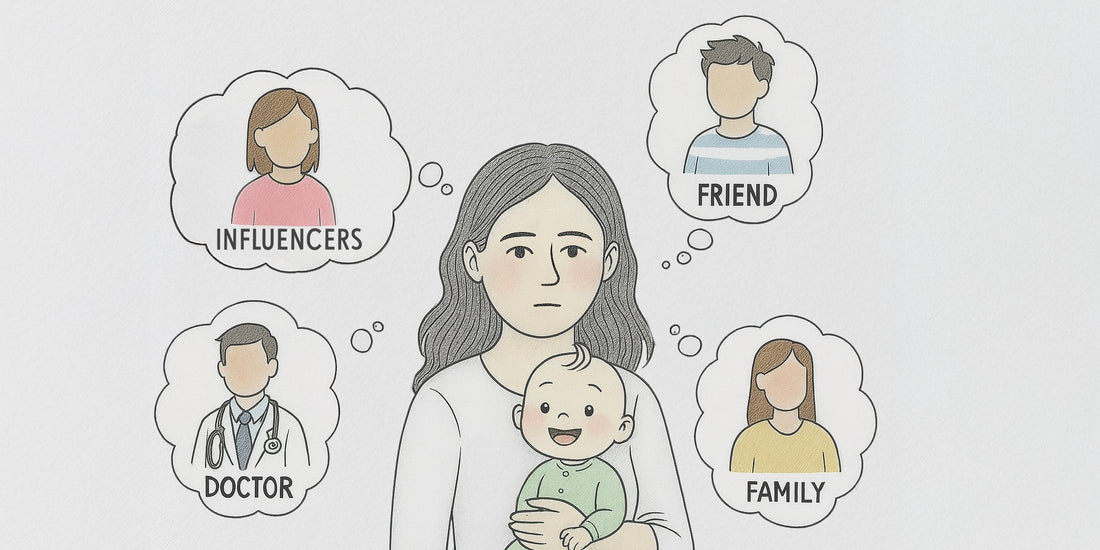
Redefining “Success” In Parenting
Share
Feeling pressure to be the “perfect parent”? Totally understandable. Also, probably unrealistic.
Consider: what does a perfect parent do—or not do? Where does that sense of pressure come from?
Before we go any further, please take a moment to celebrate yourself as a parent. Whatever you’re doing, however you’re doing it, has brought your family to today. You’ve made it this far, and whether that’s a week or a year, it’s confirmation that you’re doing something right. Many things, in fact.
A new parent is learning on their feet, adapting to this latest version of themselves while forming a relationship with a brand new person. They’re vulnerable as they bob and weave emotionally and intellectually, stretching their definitions of pretty much everything. Doctors, family, friends…people who offer support, even with the best of intentions, tend to be generous with their experiences. Their advice. Their priorities. When we adopt these rather than considering them to be options, their standards for “success” become ours. And since they often contradict each other—or our own instincts—it quickly becomes hard to feel successful as a parent. With a checklist of goals that don’t belong to us, it’s easy to mark the “fail” box many times a day.
Here’s where it gets interesting: stir in a daily helping (or many helpings) of social media. When you look at it objectively, we are inviting strangers—influencers, experts—into our lives, into our homes. They’ve never met you or your baby, have no familiarity with your circumstances, and yet their voices carry weight. After all, they have followings. Thousands—millions—of people value their expertise, so it makes sense to give them a listen. How can we know more than this expert, we wonder…and we invite them in.
Sometimes, in the process of absorbing their wisdom, we lose touch with our own. The nuance of what works for your baby, your situation, your family is lost. It’s kind of like clothing size. While you may wear a particular size, it doesn’t mean that everything you try on in that size fits. But unlike clothes shopping, the process of trying out options lands very differently when it comes to parenting. We are ever-aware of the watchful eyes of our peers and support people, whether in person or online. We want to fit in. We want to be accepted. We want this to work. And more than anything, we want to do right by our child.
The Invisible Checklist You Didn’t Sign Up For
Somewhere in this process, we start to create an outside-in rubric for ourselves as parents. Are we meeting the standards others have set for us? For our babies? And since there are so many standard setters, the goal post is forever shifting.
Birth plan went sideways? Fail. Baby didn’t self-soothe? Fail. Didn’t sleep “enough” hours or in the “right” place? Didn’t latch immediately? Didn’t start solids on someone else’s timeline? Fail. Fail. Fail.
Given this common reality, how can we feel “successful” as parents? The answer is surprisingly simple: choosing realistic, internal standards.
Did I meet my baby’s needs in the way that worked best for us? Success. Did I find a solution that met my own needs for sleep, bodily autonomy, and emotional wellness? Am I open to options and change? Do I trust myself to know my own child? Success. Success. Success.
Classic example: Where does your baby sleep, and why?
The where feels simple before the baby is born, because it’s conceptual. After the arrival, all bets are off—because that’s when the why kicks in.
So many factors enter into play: birth recovery, the baby’s temperament, feeding challenges, emotional adjustment, and more. So you start exploring options, and you’re doing it!—finding your way. Until—
Enter the “experts”:
Doctor: Babies need to sleep in the crib!
Your mom: With you.
Your friend: I sleep trained in utero, and it always worked.
Social media: 267 options, all of which are backed up by seemingly rational theories and have significant followings.
Womp womp
Trying to meet everyone else’s objectives is a fast track to chasing an ever-elusive sense of confidence. It’s exhausting—and at the same time potentially unfulfilling. It’s impossible to meet everyone else’s expectations—the game is rigged. It’s ok and even healthier to stop playing.
Seeing your family as perfect in its imperfection will allow you to shift your goals to ones that meet your family’s needs. Not a hypothetical family. Yours.
Tools, Not Rules
The input of influencers, experts, doctors, and family members becomes productive when they serve as tools, not rules. When they’re consultants with offerings of guidance that you can sort through and choose from rather than rigid sources of stress.
Parenting is about adaptation. Nothing is static, and no one product or approach works with all babies—or their parents—at all times. If a concept or strategy doesn’t land well, consider: “If this was a shirt, would I buy it?” If it’s too tight, itchy, or too expensive, you probably wouldn’t. You can apply the same process to parenting advice. Give yourself permission to pick up the shirt, look at it, and put it back on the rack. You might even come back for it. You just know that there’s probably something out there that’s a better fit.
When you adapt to the present, existing situation, you are succeeding as a parent. Your child is a moving target—their needs will continually change, and you will evolve to be the parent needed at that moment. You’ll do your best, whatever your best is that day. It’s that simple.
_______________________________
Interested in our Tools, Not Rules approach? We make the little things you need to get through the big things—designed to help new parents feel competent, confident, and connected.
- Thoughtful tools.
- Postpartum-friendly gifts.
- Created by someone who’s actually been in the room.
